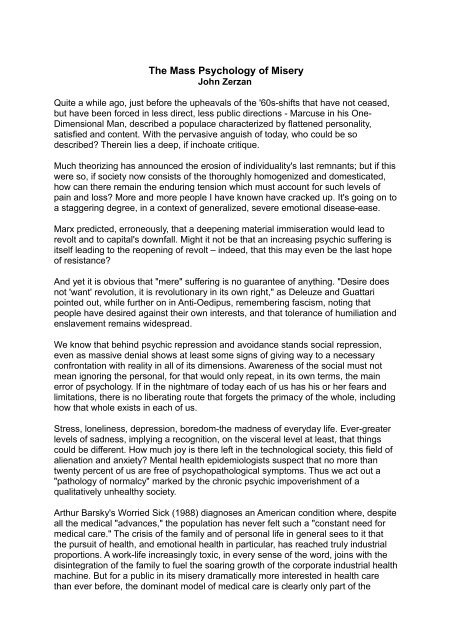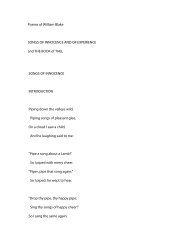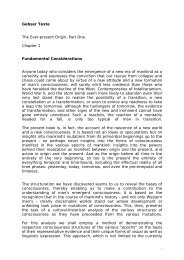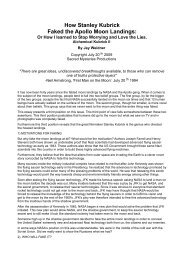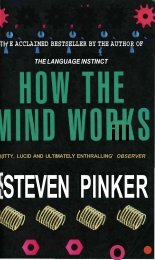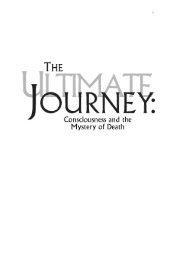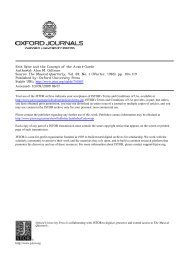The Mass Psychology of Misery - michaeljgoodnight.com
The Mass Psychology of Misery - michaeljgoodnight.com
The Mass Psychology of Misery - michaeljgoodnight.com
Create successful ePaper yourself
Turn your PDF publications into a flip-book with our unique Google optimized e-Paper software.
problem, not its solution. Thus Thomas Bittker writes <strong>of</strong> "<strong>The</strong> Industrialization <strong>of</strong>American Psychiatry" (American Journal <strong>of</strong> Psychiatry, February 1985) and GinaKolata discusses how much distrust <strong>of</strong> doctors exists, as medicine is seen as justanother business (New York Times, February 20, 1990).<strong>The</strong> mental disorder <strong>of</strong> going along with things as they are is now treated almostentirely by biochemicals, to reduce the individual's consciousness <strong>of</strong> socially inducedanguish. Tranquilizers are now the world's most widely prescribed drugs, and antidepressantsset record sales as well. Temporary relief-despite side-effects andaddictive properties-is easily obtained, while we are all ground down a little more.<strong>The</strong> burden <strong>of</strong> simply getting by is "Why All Those People Feel <strong>The</strong>y Never Have AnyTime," according to Trish Hall (New York Times, January 2, 1988), who concludedthat 'everybody just seems to feel worn out" by it all.An October '89 Gallup poll found that stress-related illness is be<strong>com</strong>ing the leadinghazard in the nation's workplaces, and a month later an almost five-fold increase inCalifornia stress-related disability claims was reported to have occurred between1982 and 1986. More recent figures estimate that almost two-thirds <strong>of</strong> new cases inemployee assistance programs represent psychiatric or stress symptoms. In hisModern Madness (1986), Douglas La Bier asked, "What is it about work today thatcan cause such harm?"Part <strong>of</strong> the answer is found in a growing literature that reveals the Information Age"<strong>of</strong>fice <strong>of</strong> tomorrow" to be no better than the sweatshop <strong>of</strong> yesteryear. In fact,<strong>com</strong>puterization introduces a neo-Taylorist monitoring <strong>of</strong> work that surpasses allearlier management control techniques. <strong>The</strong> "technological whip" now increasinglyheld over white-collar workers prompted Curt Supplee, in a January '90 WashingtonPost article, to judge, "We have seen the future, and it hurts." A few months earlierSue Miller wrote in the Baltimore Evening Sun <strong>of</strong> another part <strong>of</strong> the job burnoutpicture, referring to a national clinical psychology study that determined that no lessthan a staggering 93 percent <strong>of</strong> American women "are caught up in a bluesepidemic."Meanwhile, the suicide and homicide rates are rising in the U.S. and eighty percent<strong>of</strong> the populace admit to having at least thought <strong>of</strong> suicide. Teenage suicide has risenenormously in the past three decades, and the number <strong>of</strong> teens locked up in mentalwards has soared since 1970. So very many ways to gauge the pain: serious obesityamong children has increased more than fifty percent in the last fifteen to twentyyears; severe eating disorders (bulimia and anorexia) among college women are nowrelatively <strong>com</strong>mon; sexual dysfunction is widespread; the incidence <strong>of</strong> panic andanxiety attacks is rising to the point <strong>of</strong> possibly overtaking depression as our mostgeneral psychological malady; isolation and a sense <strong>of</strong> meaninglessness continue tomake even absurd cults and IV evangelism seem attractive to many.<strong>The</strong> litany <strong>of</strong> cultural symptomatics is virtually endless. Despite its generally escapistfunction, even much <strong>of</strong> contemporary film reflects the malaise; see Robert PhillipKolker's A Cinema <strong>of</strong> Loneliness: Penn, Kubrick, Scorsese. Spielberg, Altman, forexample. And many recent novels are even more unflinching in their depiction <strong>of</strong> thedesolation – and degradation <strong>of</strong> society, and the burnout <strong>of</strong> youth in particular, e.g.Bret Easton Ellis' Less Than Zero, Fred Pfail's Goodman 2020, and <strong>The</strong> KnockoutArtist by Harry Crews, to mention just a few.
Hooper survey indicated that work now ranks eighth out <strong>of</strong> ten on a scale <strong>of</strong>important satisfactions in life, and 1989 showed the lowest annual productivity growthsince the 1981-83 recession. <strong>The</strong> drug "epidemic," which cost the government almost$25 billion to <strong>com</strong>bat in the '80s, threatens society most acutely at the level <strong>of</strong> therefusal <strong>of</strong> work and sacrifice. <strong>The</strong>re is no "war on drugs" that can touch the situationwhile at the same time defending this landscape <strong>of</strong> pain and false values. <strong>The</strong> needfor escape grows stronger and the sick social order feels consequent desertion, thesteady corrosion <strong>of</strong> all that holds it up.Unfortunately, the biggest "escape" <strong>of</strong> all is one that serves, in the main, to preservethe distorted present: what Sennett has called "the increasing importance <strong>of</strong>psychology in bourgeois life." This includes the extraordinary proliferation <strong>of</strong> newkinds <strong>of</strong> therapy since the '60s, and behind this phenomenon the rise <strong>of</strong> psychologyas the predominant religion. In the Psychological Society the individual sees himselfas a problem. This ideology constitutes a pre-eminent social imprisonment, becauseit denies the social; psychology refuses to consider that society as a whole sharesfundamental responsibility for the conditions produced in every human being.<strong>The</strong> ramifications <strong>of</strong> this ideology can be seen on all sides For instance, the advice tothose besieged by work stress to "take a deep breath, laugh, walk it <strong>of</strong>f," etc. Or themoralizing exhortations to recycle, as if a personal ethics <strong>of</strong> consumption is a realanswer to the global eco-crisis caused by industrial production. Or the 1990California Task Force to Promote Self-Esteem as a solution to the major socialbreakdown in that state.At the very center <strong>of</strong> contemporary life, this outlook legitimates alienation, loneliness,despair, and anxiety. because it cannot see the context for our malaise. It privatizesdistress, and suggests that only non-social responses are attainable. This"bottomless fraud <strong>of</strong> mere inwardness," in Adorno's words, pervades every aspect <strong>of</strong>American life, mystifying experience and thus perpetuating oppression.<strong>The</strong> widespread allegiance to a therapeutic world view constitutes a culturetyrannized by the therapeutic in which, in the name <strong>of</strong> mental health, we are gettingmental disease. With the expanding influence <strong>of</strong> behavioral experts, powerlessnessand estrangement expand as well; modern life must be interpreted for us by the newexpertise and its popularizers.Gail Sheehy's Passages (1977), for example, considers life developments withoutreference to any social or historical context, thereby vitiating her concern for the "freeand autonomous self." Arlie Russell Hochschild's Managed Heart (1983) focuses onthe "<strong>com</strong>mercialization <strong>of</strong> human feelings" in an increasingly service-sector economy,and manages to avoid any questioning <strong>of</strong> the totality by remaining ignorant <strong>of</strong> the fact<strong>of</strong> class society and the unhappiness it produces. When Society Be<strong>com</strong>es an Addict(1987) is Anne Wilson Schaef's <strong>com</strong>pletely incoherent attempt to deny, despite thetitle, the existence <strong>of</strong> society, by dealing strictly with the interpersonal. And thesebooks are among the least escapist <strong>of</strong> the avalanche <strong>of</strong> "how-to" therapy booksinundating the bookstores and supermarkets.It is clear that psychology is part <strong>of</strong> the absence <strong>of</strong> <strong>com</strong>munity or solidarity, and <strong>of</strong> theaccelerating social disintegration. <strong>The</strong> emphasis is on changing one's personality,and avoiding at all costs the facts <strong>of</strong> bureaucratic consumer capitalism and its
meaning to our lives and consciousness. Consider Samuel Klarreich's StressSolution (1988): "...1 believe that we can largely determine what will be stressful. andhow much it will interfere with our lives, by the views we uphold irrespective <strong>of</strong> whatgoes on in the workplace." Under the sign <strong>of</strong> productivity, the citizen is now trained asa lifelong inmate <strong>of</strong> an industrial world, a condition, as Ivan Illich noted, not unrelatedto the fact that everyone tends toward the condition <strong>of</strong> therapy's patient, or at leasttends to accept its world-view.In the Psychological Society, social conflicts <strong>of</strong> all kinds are automatically shifted tothe level <strong>of</strong> psychic problems, in order that they can be charged to individuals asprivate matters. Schooling produces near-universal resistance, which is classified, forexample, as "hyperkinesis" and dealt with by drugs and/or psychiatric ideology.Rather than recognize the child's protest, his or her life is invaded still further, toensure that no one eludes the therapeutic net.It is clear that a retreat from the social, based largely on the experience <strong>of</strong> defeat andconsequent resignation, promotes the personal as the only possible terrain <strong>of</strong>authenticity. A desperate denizen <strong>of</strong> the "singles world" is quoted by Louise Banikow:"My ambition is wholly personal now. All I want to do is fall in love." But the demandfor fulfilment, however circumscribed by psychology, is that <strong>of</strong> a ravening hunger anda level <strong>of</strong> suffering that threaten to burst the bonds <strong>of</strong> the prescribed inner world. Asnoted above, indifference to authority, distrust <strong>of</strong> institutions, and a spreading nihilismmean that the therapeutic can neither satisfy the individual nor ultimately safeguardthe social order. Toynbee noted that a decadent culture furthers the rise <strong>of</strong> a newchurch that extends hope to the proletariat while servicing only the needs <strong>of</strong> theruling class. Perhaps sooner than later People will begin to realize that psychology isthis Church, Which may be the reason why so many voices <strong>of</strong> therapy now Counseltheir flocks against "unrealistic expectations" <strong>of</strong> what life could be.For over half a century the regulative, hierarchical needs <strong>of</strong> a bureaucraticconsumeristsystem have sought modern means <strong>of</strong> control and prediction. <strong>The</strong> sameconsolatory ideology <strong>of</strong> the psychological outlook, in which the self is the overarchingform <strong>of</strong> reality, has served these control needs and owes most <strong>of</strong> itsassumptions to Sigmund Freud.For Freud and his Wagnerian theory <strong>of</strong> warring instincts and the arbitrary division <strong>of</strong>the self into id, ego and superego, the passions <strong>of</strong> the individual were primordial anddangerous. <strong>The</strong> work <strong>of</strong> civilization was to check and harness them. <strong>The</strong> wholeedifice <strong>of</strong> psychoanalysis, Freud said, is based upon the theory <strong>of</strong> necessaryrepression; domination is obviously assisted by this view. That human culture isestablished only by means <strong>of</strong> suffering, that constant renunciation <strong>of</strong> desire isinevitable for continuance <strong>of</strong> civilization, that work is sustained by the energy <strong>of</strong>stifled love-all this is required by the "natural aggressiveness" <strong>of</strong> "human nature," thelatter an eternal and universal fact, <strong>of</strong> course.Understanding fully the deforming force <strong>of</strong> all this repression, Freud considered itlikely that neurosis has <strong>com</strong>e to characterize all <strong>of</strong> humanity. Despite his growing fear<strong>of</strong> fascism after World War 1, he nonetheless contributed to its growth by justifyingthe renunciation <strong>of</strong> happiness. Reich referred to Freud and Hitler with somebitterness, observing that "a few years later, a pathological genius – making the best
<strong>of</strong> ignorance and fear <strong>of</strong> happiness – brought Europe to the verge <strong>of</strong> destruction withthe slogan <strong>of</strong> 'heroic renunciation'."With the Oedipus <strong>com</strong>plex, inescapable source <strong>of</strong> guilt and repression, we see Freudagain as the consummate Hobbesian. This universal condition is the vehicle wherebyself-imposed taboos are learned via the (male) childhood' experience <strong>of</strong> fear <strong>of</strong> thefather and lust for the mother. It is based on Freud's reactionary fairy tale <strong>of</strong> a primalhorde dominated by a powerful father who possessed all available women and whowas killed and devoured by his sons. This was ludicrous anthropology even whenpenned, and fully exhibits one <strong>of</strong> Freud's most basic errors, that <strong>of</strong> equating societywith civilization. <strong>The</strong>re is now convincing evidence that precivilized life was a time <strong>of</strong>non-dominance and equality, certainly not the bizarre patriarchy Freud provided asorigin <strong>of</strong> most <strong>of</strong> our sense <strong>of</strong> guilt and shame. He remained convinced <strong>of</strong> theinescapability <strong>of</strong> the Oedipal background, and the central validity <strong>of</strong> both the Oedipal<strong>com</strong>plex and <strong>of</strong> guilt itself for the interests <strong>of</strong> culture.Freud considered psychic life as shut in on itself, uninfluenced by society. Thispremise leads to a deterministic view <strong>of</strong> childhood and even infancy, along with suchjudgements as "the fear <strong>of</strong> be<strong>com</strong>ing poor is derived from regressive anal eroticism,Consider his Psychopathology <strong>of</strong> Everyday Life, and its ten editions between 1904and 1924 to which new examples <strong>of</strong> "slips," or unintended revelatory usages <strong>of</strong>words, were continually added. We do not find a single instance, despite theupheavals <strong>of</strong> many <strong>of</strong> those years in and near Austria, <strong>of</strong> Freud detecting a "slip" thatrelated to fear <strong>of</strong> revolution on the part <strong>of</strong> this bourgeois subjects, or even <strong>of</strong> any dayto-daysocial fears, such as related to strikes, insubordination, or the like. It seemsmore than likely that unrepressed slips concerning such matters were simplescreened Out as unimportant to his universalist, ahistorical views.Also worth noting is Freud's "discovery" <strong>of</strong> the death instinct In his deepeningpessimism, he countered Eros, the life instinct with Thanatos, a craving for death anddestruction, as fundamental and ineradicable a part <strong>of</strong> the species as Striving for life.<strong>The</strong> aim <strong>of</strong> all life is death," simply put (1920). While it may be pedestrian to note thatthis discovery was ac<strong>com</strong>panied by the mass carnage <strong>of</strong> World War 1, anincreasingly unhappy marriage, and the onset <strong>of</strong> cancer <strong>of</strong> the jaw, there is nomistaking the service this dystopian metaphysics performs in justifying authority. <strong>The</strong>assumption <strong>of</strong> the death instinct – that aggression, hatred, and fear will always bewith us – militates against the idea that liberation is possible. In later decades, thedeath instinct-oriented work <strong>of</strong> Melanie Klein flourished in English ruling circlesprecisely because <strong>of</strong> its emphasis on social restraints in limiting aggressiveness.Today's leading neo-Freudian, Lacan, also seems to see suffering and domination asinevitable; specifically, he holds that patriarchy is a law <strong>of</strong> nature.Marcuse, Norman O. Brown and others have re-theorized Freud in a radical directionby taking his ideas as descriptive rather than prescriptive, and there is a limitedplausibility to an orientation that takes his dark views as valid only with respect toalienated life, rather than to any and all imaginable social worlds. <strong>The</strong>re are evenmany Freudian feminists; their efforts to apply psychoanalytic dogma to theoppression <strong>of</strong> women, however, appear even more contrived.Freud did identify the "female principle" as closer to nature, less sublimated, lessdiffused through repression than that <strong>of</strong> the male. But true to his overall values, he
located an essential advance in civilization in the victory <strong>of</strong> male intellectuality overwomanly sensuality. What is saddest about the various attempts to reappropriateFreud is the absence <strong>of</strong> a critique <strong>of</strong> civilization: his entire work is predicated on theacceptance <strong>of</strong> civilization as highest value. And basic in a methodological sense,regarding those who would merely reorient the Freudian edifice, is Foucault'swarning that the will to any system "is to extend our participation in the presentsystem."In the area <strong>of</strong> gender difference, Freud straightforwardly affirmed the basic inferiority<strong>of</strong> the female. His view <strong>of</strong> women as castrated men is a case <strong>of</strong> biologicaldeterminism: anatomically they are simply less, and condemned by this tomasochism and penis envy.I make no pretense to <strong>com</strong>pleteness or depth in this brief look at Freud, but it shouldbe already obvious how false was his disclaimer (New Introductory Lectures, 1933)that Freudianism posits any values beyond those inherent in "objective" science. Andto this fundamental failing could be added the arbitrary nature <strong>of</strong> virtually all <strong>of</strong> hisphilosophy. Divorced as it pointedly is from gross social reality – further examples arelegion, but seduction theory <strong>com</strong>es to mind, in which he declared that sexual abuseis, most importantly, fantasy – one Freudian inference could just as plausibly bereplaced by a different one. Overall, we encounter, in the summary <strong>of</strong> FrederickCrews, "a doctrine plagued by mechanism, reification, and arbitrary universalism."On the level <strong>of</strong> treatment, by his own accounts, Freud never was able to permanentlycure a single patient, and psychoanalysis has proven no more effective since. In1984 the National Institute <strong>of</strong> Mental Health estimated that over forty millionAmericans are mentally ill, while a study by Regier, Boyd et al. (Archives <strong>of</strong> GeneralPsychiatry, November 1988) showed that fifteen percent <strong>of</strong> the adult population had a"psychiatric disorder." One obvious dimension <strong>of</strong> this worsening situation, in JoelKovel's words, is the contemporary family, which "has fallen into a morass <strong>of</strong>permanent crisis, as indicated by the endless stream <strong>of</strong> emotionally disabledindividuals it turns over to the mental health industry.If alienation is the essence <strong>of</strong> all psychiatric conditions, <strong>Psychology</strong> is the study <strong>of</strong> thealienated, but lacks the awareness that this is so. <strong>The</strong> effect <strong>of</strong> the total society, inwhich the individual can no longer recognize himself or herself, by the canons <strong>of</strong>Freud and the Psychological Society, is seen as irrelevant to diagnosis andtreatment. Thus psychiatry appropriates disabling pain and frustration, redefinesthem as illnesses and, in some cases, is able to suppress the symptoms. Meanwhile,a morbid world continues its estranging technological rationality that excludes anycontinuously spontaneous, affective life: the person is subjected to a disciplinedesigned, at the expense <strong>of</strong> the sensuous, to make him or her an instrument <strong>of</strong>production.Mental illness is primarily an unconscious escape from this design, a form <strong>of</strong> passiveresistance. R.D. Laing spoke <strong>of</strong> schizophrenia as a psychic numbing which feigns akind <strong>of</strong> death to preserve something <strong>of</strong> one's inner aliveness. <strong>The</strong> representativeschizophrenic is around 20, at the point <strong>of</strong> culmination <strong>of</strong> the long period <strong>of</strong>socialization which has prepared him to take up his role in the workplace. He is not"adequate" to this destiny. Historically, it is noteworthy that schizophrenia is very
closely related to industrialism, as Torrey shows convincingly in his Schizophreniaand Civilization (1980).In recent years Szasz, Foucault, G<strong>of</strong>fman, and others have called attention to theideological preconceptions through which "mental illness" is seen. "Objective"language cloaks cultural biases, as in the case, for instance, <strong>of</strong> sexual "disorders": inthe 19th century masturbation was treated as a disease, and it has only been withinthe past twenty years that the psychological establishment declassifiedhomosexuality as illness.And it has long been transparent that there is a class <strong>com</strong>ponent to the origins andtreatment <strong>of</strong> mental illness. Not only is what is called "eccentric" among the rich <strong>of</strong>tentermed psychiatric disorder-and treated quite differently among the poor, but manystudies since Hollingshead and Redlich's Social Class and Mental Illness (1958)have demonstrated how much more likely are the poor to be<strong>com</strong>e emotionallydisabled. Roy Porter observed that because it imagines power, madness is bothimpotence and omnipotence, which serves as a reminder that due to the influence <strong>of</strong>alienation, powerlessness, and poverty, women are more <strong>of</strong>ten driven to breakdownthan men. Society makes us all feel manipulated and thus mistrustful: "paranoid," andwho could not be depressed? <strong>The</strong> gap between the alleged neutrality and wisdom <strong>of</strong>the medical model and the rising levels <strong>of</strong> pain and disease is widening, thecredibility <strong>of</strong> the former visibly corroding.It has been the failure <strong>of</strong> earlier forms <strong>of</strong> social control that has given psychologicalmedicine, with its inherently expansionist aims, its upward trajectory in the past threedecades. <strong>The</strong> therapeutic model <strong>of</strong> authority (and the supposedly value-freepr<strong>of</strong>essional power that backs it up) is increasingly intertwined with state power, andhas mounted an invasion <strong>of</strong> the self much more far reaching than earlier efforts,"<strong>The</strong>re are no limits to the ambition <strong>of</strong> psychoanalytic control; if it had its way, nothingwould escape it," according to Guattari.In terms <strong>of</strong> the medicalization <strong>of</strong> deviant behavior, a great deal more is included,than, say, the psychiatric sanctions on Soviet dissidents or the rise <strong>of</strong> a battery <strong>of</strong>mind control techniques, including behavior modification, in U.S. Prisons Punishmenthas <strong>com</strong>e to include treatment and new powers <strong>of</strong> punishment; medicine,psychology, education and social work take over more and more aspects <strong>of</strong> controland discipline while the legal machinery grows more medical, psychological,pedagogical. But the new arrangements, relying chiefly on fear and necessitatingmore and more co-operation by the ruled in order to function, are no guarantee <strong>of</strong>civic harmony. In fact, with their overall failure, class society is running out <strong>of</strong> tacticsand excuses, and the new encroachments have created new pockets <strong>of</strong> resistance.<strong>The</strong> setup now usually referred to as "<strong>com</strong>munity mental health" can be legitimatelytraced to the establishment <strong>of</strong> the Mental Hygiene Movement in 1908. In the context<strong>of</strong> the Taylorist degradation <strong>of</strong> work called Scientific Management and a challengingtide <strong>of</strong> worker militancy, the new psychological <strong>of</strong>fensive was based on the dictumthat "individual unrest to a large degree means bad mental hygiene." Communitypsychiatry represents a later, nationalized form <strong>of</strong> this industrial psychology,developed to deflect radical currents away from social transformation objectives andback under the yoke <strong>of</strong> the dominating logic <strong>of</strong> productivity. By the 1920s, the workershad be<strong>com</strong>e the objects <strong>of</strong> social science pr<strong>of</strong>essionals to an even greater degree,
with the work <strong>of</strong> Elton Mayo and others, at a time when the promotion <strong>of</strong> consumptionas a way <strong>of</strong> life came to be seen as itself a means <strong>of</strong> easing unrest, collective andindividual. And by the end <strong>of</strong> the 1930s, industrial psychology had "already developedmany <strong>of</strong> the central innovations which now characterize <strong>com</strong>munity psychology,"according to Diana Ralph's Work and Madness (1983), such as mass psychologicaltesting, the mental health team, auxiliary non-pr<strong>of</strong>essional counselors, family andout-patient therapy, and psychiatric counseling to businesses.<strong>The</strong> million-plus men rejected by the armed forces during World War II for "mentalunfitness" and the steady rise. observable since the mid-'50s, in stress-relatedillnesses, called attention to the immensely crippling nature <strong>of</strong> modern industrialalienation. Government funding was called for, and was provided by the 1963 federalCommunity Mental Health Center legislation. Armed with the relatively newtranquilizing drugs to anaesthetize the poor as well as the unemployed, a statepresence was initiated in urban areas hitherto beyond the reach <strong>of</strong> the therapeuticethos. Small wonder that some black militants saw the new mental health services asbasically refined police pacification and surveillance systems for the ghettos. <strong>The</strong>concerns <strong>of</strong> the dominant order, ever anxious about the masses, are chiefly served,however, here as elsewhere, by the strength <strong>of</strong> the image <strong>of</strong> what science has shownto be normal, healthy, and productive. Authority's best friend is relentless selfinspectionaccording to the ruling canons <strong>of</strong> repressive normalcy in the PsychologicalSociety.<strong>The</strong> nuclear family once provided the psychic underpinning <strong>of</strong> what Norman O.Brown called "the nightmare <strong>of</strong> infinitely expanding technological progress." Thoughtby some to be a bastion against the outer world, it has always served astransmission belt for the reigning ideology, more specifically as the place in which theinteriorizing psychology <strong>of</strong> women is produced, the social and economic exploitation<strong>of</strong> women is legitimated and the artificial scarcity <strong>of</strong> sexuality is guarded.Meanwhile, the state's concern with delinquent, uneducable and unsocializablechildren, as studied by Donzelot and others, is but one aspect <strong>of</strong> its overshadowing<strong>of</strong> the family. Behind the medicalized image <strong>of</strong> the good, the state advances and thefamily steadily loses its functions. Rothbaum and Weisz, in Child Psychopathologyand the Quest for Control (1989), discuss the very rapid rise <strong>of</strong> their subject whileCastel, Castel and Lovell's earlier <strong>The</strong> Psychiatric Society (1982) could glimpse thenearing day when childhood will be totally regimented by medicine and psychology.Some facets <strong>of</strong> this trend are no longer in the realm <strong>of</strong> conjecture; James R.Schiffman, for instance, wrote <strong>of</strong> one by-product <strong>of</strong> the battered family in his "Teen-Agers End Up in Psychiatric Hospitals in Alarming Numbers" (Wall Street Journal,Feb. 3, 1989).<strong>The</strong>rapy is a key ritual <strong>of</strong> our prevailing psychological religion and a vigorouslygrowing one. <strong>The</strong> American Psychiatric Association's membership jumped from27,355 in 1983 to 36,223 by the end <strong>of</strong> the '80s, and in 1989 a record 22 millionvisited psychiatrists or other therapists covered to at least some extent by healthinsurance plans. Considering that only a small minority <strong>of</strong> those who practice theestimated 500 varieties <strong>of</strong> psychotherapy are psychiatrists or otherwise healthinsurance-recognized, even these figures do not capture the magnitude <strong>of</strong> therapy'sshadow world.
Philip Rieff termed psychoanalysis "yet another method <strong>of</strong> learning how to endure theloneliness produced by culture," which is a good enough way to introduce theartificial situation and relationship <strong>of</strong> therapy, a peculiarly distanced. circumscribedand asymmetrical affair. Most <strong>of</strong> the time, one person talks and the other listens. <strong>The</strong>client almost always talks about himself and the therapist almost never does. <strong>The</strong>therapist scrupulously eschews social contact with clients. another reminder to thelatter that they have not been talking to a friend, along with the strict time limitsenclosing a space divorced from everyday reality. Similarly, the purely contractualnature <strong>of</strong> the therapeutic connection in itself guarantees that all therapy inevitablyreproduces alienated society. To deal with alienation via a relationship paid for b thehour is to overlook the congruence <strong>of</strong> therapist and prostitute as regards the traitsjust enumerated.Gramsci defined "intellectual" as the "functionary in charge <strong>of</strong> consent," a formulationwhich also fits the role <strong>of</strong> therapist. By leading others to concentrate their 'desiringenergy outside the social territory," as Guattari put it, he thereby manipulates theminto accepting the constraints <strong>of</strong> society. By failing to challenge the social categorieswithin which clients have organized their experiences, the therapist strengthens thehold <strong>of</strong> those categories. He tries, typically, to focus clients away from stories aboutwork and into the so-called "real" areas-personal life and childhood.Psychological health, as a function <strong>of</strong> therapy, is largely an educational procedure.<strong>The</strong> project is that <strong>of</strong> a shared system: the client is led to acceptance <strong>of</strong> thetherapist's basic assumptions and metaphysics. Francois Roustang, inPsychoanalysis Never Lets Go (1983), wondered why a therapeutic method whose"explicit aim is the liberation <strong>of</strong> forces with a view toward being capable '<strong>of</strong> enjoymentand efficiency' (Freud) so <strong>of</strong>ten ends in alienation either...because the treatment turnsout to be interminable, or...(the client) adopts the manner <strong>of</strong> speech and thought, thetheses as well as the prejudices <strong>of</strong> psychoanalysis."Ever since Hans Lysenko's short but famous article <strong>of</strong> 1952, "<strong>The</strong> Effects <strong>of</strong>Psychotherapy," countless other studies have validated his finding: "Persons givenintensive and prolonged psychotherapy are no better <strong>of</strong>f than those in matchedcontrol groups given no treatment over the same time interval." On the other hand,there is no doubt that therapy or counseling does make many people feel better,regardless <strong>of</strong> specific results. This anomaly must be due to the fact that consumers <strong>of</strong>therapy believe they have been cared for, <strong>com</strong>forted, listened to. In a society growingever Colder, this is no small thing. It is also true that the Psychological Societyconditions its subjects into blaming themselves and that those who most feel theyneed therapy tend to be those most easily exploited: the loneliest, most insecurenervous, depressed, etc. It is easy to state the old dictum, "Natura sanat, medicuscurat" (Nature heals, doctors/counselors/therapists treat); but where is the natural inthe hyper-estranged world <strong>of</strong> pain and isolation we find ourselves in? And yet there isno getting around the imperative to remake the world. If therapy is to heal, makewhole, what other possibility is there but to transform this world, which would <strong>of</strong>course also constitute a de-therapizing <strong>of</strong> society. It is clearly in this spirit that theSituationist International declared in 1963, "Sooner or later the S.I. must define itselfas a therapeutic."Unfortunately, the great <strong>com</strong>munal causes later in the decade acquired a specificallytherapeutic cast mainly in their degeneration, in the splintering <strong>of</strong> the '60's thrust into
smaller, more idiosyncratic efforts. "<strong>The</strong> personal is the political" gave way to themerely personal, as defeat and disillusion overtook naive activism.Conceived out <strong>of</strong> critical responses to Freudian psychoanalysis, which has shifted itssights toward ever-earlier phases <strong>of</strong> development in childhood and infancy, theHuman Potential Movement began in the mid-60s and acquired its characteristicfeatures by the early '70s. With a post-Freudian emphasis on the conscious ego andits actualization, Human Potential set forth a smorgasbord <strong>of</strong> therapies, includingvarieties or amalgams <strong>of</strong> personal growth seminars, body awareness techniques,and Eastern spiritual disciplines. Almost buried in the welter <strong>of</strong> partial solutions lies asubversive potential: the notion that, as Adelaide Bry put it, life "can be a time <strong>of</strong>infinite and joyous possibility." <strong>The</strong> demand for instant relief from psychicimmiseration underlined an increasing concern for the dignity and fulfillment <strong>of</strong>individuals, and Daniel Yankelovich (New Rules, 1981) saw the cultural centrality <strong>of</strong>this quest, concluding that by the end <strong>of</strong> the '70s, some eighty percent <strong>of</strong> Americanshad be<strong>com</strong>e interested in this therapeutic search for transformation.But the privatized approaches <strong>of</strong> the Human Potential Movement, high-water mark <strong>of</strong>contemporary Psychological Society, were obviously unable to deliver on theirpromises to provide any lasting, non-illusory breakthroughs. Arthur Janov recognizedthat "everyone in this society is in a lot <strong>of</strong> pain," but expressed no awareness at all <strong>of</strong>the repressive society generating it. His Primal Scream technique qualifies as themost ludicrous cure-all <strong>of</strong> the '70s. Scientology's promise <strong>of</strong> empowerment consistedmainly <strong>of</strong> bioelectronic feedback technologies aimed at socializing people to anauthoritarian enterprise and world view. <strong>The</strong> popularity <strong>of</strong> cult groups like the Mooniesreminds one <strong>of</strong> a time-tested process for the uninitiated: isolation, deprivation,anticipation, and suggestion; brainwashing and the shamanic vision quest both use it.Werner Erhard's EST, speaking <strong>of</strong> intensive psychological manipulation was one <strong>of</strong>the most popular and, in some ways, most characteristic Human Potentialphenomena. Its founder became very wealthy by helping Erhard Seminars Trainingadepts "choose to be<strong>com</strong>e what they are." In a classic case <strong>of</strong> blaming the victim,EST brought large numbers to a near-religious embrace <strong>of</strong> one <strong>of</strong> the system's basiclies: its graduates are obediently conformist because they "accept responsibility" forhaving created things as they are. Transcendental Meditation actually marketed itselfin terms <strong>of</strong> the passive incorporation into society it helped its students achieve. TM'salleged usefulness for adjustment to the varied "excesses and stresses" <strong>of</strong> modernsociety was a major selling point to corporations, for example.Trapped in a highly rationalized and technological world, Human Potential seekersnaturally wanted personal development, emotional immediacy, and above all, asense <strong>of</strong> having some control over their lives. Self-help best-sellers <strong>of</strong> the '70s,including Power, Your Erroneous Zones, How to Take Charge <strong>of</strong> Your Life, Self-Creation, Looking Out for #1, and Pulling Your Own Strings, focus on the issue <strong>of</strong>control. Preaching the gospel <strong>of</strong> reality as a personal construct, however, meant thatcontrol had to be narrowly defined. Once again acceptance <strong>of</strong> social reality as agiven meant, for example, that "sensitivity training" would likely mean continuedinsensitivity to most <strong>of</strong> reality, an openness to more <strong>of</strong> the same alienation-moreignorance, more suffering.
<strong>The</strong> Human Potential Movement did at least raise publicly and widely the notion <strong>of</strong> anend to disease, however much it failed to make good on that claim. As more andmore <strong>of</strong> everyday life has <strong>com</strong>e under medical dominion and supervision, the almostbewildering array <strong>of</strong> new therapies was part <strong>of</strong> an undercutting <strong>of</strong> the older, mainlyFreudian, "scientific" model for behavior. In the shift <strong>of</strong> therapeutic expectations, aradical hope appeared, which went beyond merely positive-thinking or emptyconfessionalist aspects and is different from quiescence.A current form <strong>of</strong> self-help which clearly represents a step forward from bothtraditional therapy, <strong>com</strong>modified and under the direction <strong>of</strong> expertise, and the massmarketedseminar-introduction sort <strong>of</strong> training is the very popular "support group."Non-<strong>com</strong>mercial and based on peer-group equality. support groups for many types <strong>of</strong>emotional distress have quadrupled in number in the past ten years. Where thesegroups do not enforce the 12-step ideology <strong>of</strong> "anonymous" groups (e.g. AlcoholicsAnonymous) based on the individual's subjection to a "Higher Power" (read: allconstituted authority and most <strong>of</strong> them do not-they provide a great source <strong>of</strong>solidarity, and work against the depoliticizing force <strong>of</strong> illness or distress experiencedin an isolated state.If the Human Potential Movement thought it possible to re-create personality andthus transform life, New Ageism goes it one better with its central slogan, "Createyour own reality." Considering the advancing, invasive desolation, an alternativereality seems desirable-the eternal consolation <strong>of</strong> religion. For the New Age, boomingsince the mid-1980s, is essentially a religious turning away from reality by peoplewho are overloaded by feelings <strong>of</strong> helplessness and powerlessness, a more definitiveturning away than that <strong>of</strong> the prevailing psychologistic evasion. Religion invents arealm <strong>of</strong> non-alienation to <strong>com</strong>pensate for the actual one; New Age philosophyannounces a <strong>com</strong>ing new era <strong>of</strong> harmony and peace, obviously inverting the present,unacceptable state. An undemanding, eclectic, materialistic substitute religion whereany balm, any occult nonsense-channeling, crystal healing, reincarnation, rescue byUFOs, etc.-goes. "It's true if you believe it."Anything goes, so long as it goes along with what authority has ordained: anger is"unhealthy," "negativity" a condition to be avoided at all costs. Feminism and ecologyare supposedly "roots" <strong>of</strong> the New Age scene, but likewise were militant workers a"root" <strong>of</strong> the Nazi movement (National Socialist German Workers Party, remember).Which brings to mind the chief New Age influence, Carl Jung. It is unknown orirrelevant to "non judgmental" bliss-seekers that in his attempt to resurrect all the oldfaiths and myths, Jung was less a psychologist than a figure <strong>of</strong> theology and reactionFurther, as president <strong>of</strong> the International Society for Psychotherapy from 1933 to1939, he presided over its Nazified German section and co-edited the ZentralblattfurPsychotherapie (with M.H. Goring, cousin <strong>of</strong> the Reichsmarshall <strong>of</strong> the same name).Still gathering steam, apparently, since the appearance <strong>of</strong> Otto Kernberg's BorderlineConditions and pathological Narcissism (1975) and <strong>The</strong> Culture <strong>of</strong> Narcissism byChristopher Lasch (1978), is the idea that "narcissistic personality disorders" are theepitome <strong>of</strong> what is happening to all <strong>of</strong> us, and represent the "underlying characterstructure" <strong>of</strong> our age Narcissus, the image <strong>of</strong> self-love and a growing demand forfulfillment, has replaced Oedipus, with its <strong>com</strong>ponents <strong>of</strong> guilt and repression, as themyth <strong>of</strong> our time-a shift proclaimed and adopted far beyond the Freudian <strong>com</strong>munity.
In passing, it is noteworthy that this change, underway since the '60s, seems toconnect more with the Human Potential search for self-development than with NewAge whose devotees take their desires less seriously. Common New Age nostrums,e.g. "You are infinitely creative," "You have unlimited potential," smack <strong>of</strong> a vaguewish-fulfillment sanitized against anger, by those who doubt their own capacities forchange and growth. Though the concept <strong>of</strong> narcissism is somewhat elusive, clinicallyand socially, it is <strong>of</strong>ten expressed in a demanding, aggressive way that frightensvarious partisans <strong>of</strong> traditional authority. <strong>The</strong> Human Potential preoccupation with"getting in touch with one's feelings," it must be added, was not nearly as stronglyself affirming as narcissism is, where feelings-chiefly anger- are more powerful thanthose that need to be searched for.Lasch's Culture <strong>of</strong> Narcissism remains extremely influential as a social analysis <strong>of</strong> thetransition from Oedipus to Narcissus, given great currency and publicity by those wholament this turning away from internalized sacrifice am respect for authority. <strong>The</strong>"new leftist" Lasch proved himself a strict Freudian, and an overtly conservative oneat that, looking back nostalgically at the days <strong>of</strong> the authoritarian conscience basedon strong parental and social discipline <strong>The</strong>re is no trace <strong>of</strong> refusal in Lasch's work,which embraces the existing repressive order as the only available morality. Similarto his sour rejection <strong>of</strong> the "impulse-ridden" narcissistic personality is Neil Postman'sAmusing Ourselves to Death (1985). Postman moralizes about the decline <strong>of</strong> politicaldiscourse, no longer "serious" but "shriveled and absurd," a condition caused by thewidespread attitude that "amusement and pleasure" take precedence over "seriouspublic involvement." Sennett and Bookchin can be mentioned as two other erstwhileradicals who see the narcissistic withdrawal from the present political framework asanything but positive or subversive. But even an orthodox Freudian like RussellJacoby (Telos, Summer 1980) recognized that in the corrosion <strong>of</strong> sacrifice,"narcissism harbors a protest in the name <strong>of</strong> individual health and happiness," andGilles Lipovetsky considered narcissism in France to have been born during the May,'68 uprisings.Thus narcissism is more than just the location <strong>of</strong> desire in the self, or the equallyubiquitous necessity to maintain feelings <strong>of</strong> self-identity and self-esteem. <strong>The</strong>re aremore and more "narcissistically troubled" people, products <strong>of</strong> the lovelessness andextreme alienation <strong>of</strong> modern divided society, and its cultural and spiritualimpoverishment. Deep feelings <strong>of</strong> emptiness characterize the narcissist, coupled witha boundless rage, <strong>of</strong>ten just under the surface, at the sense <strong>of</strong> dependency feltbecause <strong>of</strong> dominated life, and the hollowness <strong>of</strong> one starved by a deficient reality.Freudian theory attributes the <strong>com</strong>mon trait <strong>of</strong> defiance to an immature "clinging toanal eroticism," while ignoring Society just as Lasch expresses his fear <strong>of</strong> narcissisticresentment and insubordination" in a parallel defense <strong>of</strong> oppressive existence. <strong>The</strong>angry longing for autonomy and self-worth brings to mind another clash <strong>of</strong> values thatrelates to value itself. In each <strong>of</strong> us lives a narcissist who wants to be loved forhimself or herself and not for his or her abilities, or even qualities. Value per se,intrinsic-a dangerously anti-instrumental, anti-capital orientation. To a Freudiantherapist like Arnold Rothstein, this "expectation that the world should gratify him justbecause he wishes it" is repugnant. He prescribes lengthy psychoanalysis which willultimately permit an acceptance <strong>of</strong> "the relative passivity, helplessness, andvulnerability implicit in the human condition."
Others have seen in narcissism the hunger for a qualitatively different world. NormanO. Brown referred to its project <strong>of</strong> "loving union with the world," while the feministStephanie Engel has argued that "the call back to the memory <strong>of</strong> original narcissisticbliss pushes us toward a dream <strong>of</strong> the future." Marcuse saw narcissism as anessential element <strong>of</strong> utopian thought, a mythic structure celebrating and yearning for<strong>com</strong>pleteness.<strong>The</strong> Psychological Society <strong>of</strong>fers, <strong>of</strong> course, every variety <strong>of</strong> <strong>com</strong>modity, from clothesand cars to books and therapies. for every life-style, in a vain effort to assuage theprevailing appetite for authenticity. Debord was right in his counsel that the more wecapitulate to a recognition <strong>of</strong> self in the dominant images <strong>of</strong> need, the less weunderstand our own existence and desires. <strong>The</strong> images society provides do notpermit us to find ourselves at home there, and one sees instead a ravening,infuriating sense <strong>of</strong> denial and loss, which nominates "narcissism" as a subversiveconfiguration <strong>of</strong> misery. Two centuries ago Schiller spoke <strong>of</strong> the "wound" civilizationhas inflicted on modern humanity-division <strong>of</strong> labor. In announcing the age <strong>of</strong>"psychological man," Philip Rieff discerned a culture "in which technics is invadingand conquering the last enemy-man's inner life, the psyche itself." In the specialistculture <strong>of</strong> our bureaucratic-industrial age, the reliance on experts to interpret andevaluate inner life is in itself the most malignant and invasive reach <strong>of</strong> division <strong>of</strong>labor. As we have be<strong>com</strong>e more alien from our own experiences, which areprocessed, standardized, labeled, and subjected to hierarchical control, technologyemerges as the power behind our misery and the main form <strong>of</strong> ideologicaldomination. In fact, technology <strong>com</strong>es to replace ideology. <strong>The</strong> force deforming usstands increasingly revealed, while illusions are ground away by the process <strong>of</strong>immiseration.Lasch and others may resent and try to discount the demanding nature <strong>of</strong> thecontemporary "psychological" spirit, but what is contested has clearly widened for agreat many, even if the out<strong>com</strong>e is equally unclear. Thus the Psychological Societymay be failing to deflect or even defer conflict by means <strong>of</strong> its favorite question, "Canone change?" <strong>The</strong> real question is whether the world-that-enforces-our-inability-tochangecan be forced to change, and beyond recognition.Taken from Future Primitive and Other Essays, published by Autonomedia inconjunction with Anarchy: A Journal <strong>of</strong> Desire Armed. ISBN: 1-57027-000-7


